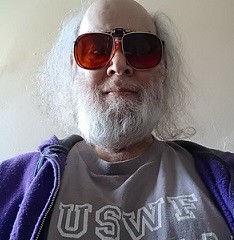Sunday, April 30, 2017
One Love: The Message of Anthony Joshua
by Eddie Goldman
It may have been logistically impossible for those who attended Donald Trump's rally Saturday evening at the Pennsylvania Farm Show Complex in Harrisburg, Pennsylvania, to have watched the live TV showing of the Anthony Joshua-Wladimir Klitschko fight from London. But in the unlikely event that they did see it live, or saw the televised replay later that night, they would have heard diametrically opposed messages.
Trump gave a speech which CNN senior political analyst David Gergen, who had been a top presidential adviser under Presidents Richard Nixon, Gerald Ford, Ronald Reagan, and Bill Clinton, said on CNN was "a deeply disturbing speech" and "the most divisive speech I have ever heard from a sitting American president." In the speech, Trump returned to his campaign's ultra-nationalist, anti-scientific, anti-immigrant, and anti-media themes. Presented on his 100th day in office, Trump has thus far had zero major legislative achievements and has the lowest approval ratings of any new president at this stage of his term since World War II. And his faithful cheered him like a rock star.
Trump even lied about the attendance at this meeting, claiming the building couldn't fit all the people who wanted to enter inside, even though there were visibly entire rows and sections of empty seats, easily seen in photographs of the event.
Across the Atlantic, in a world normally as or more sordid than politics, a boxing match was taking place, and this one legitimately had filled up 90,000 seats in London's Wembley Stadium. It also, according to promoter Eddie Hearn, broke the UK pay-per-view record of 1.15 million for the 2015 Floyd Mayweather-Manny Pacquiao fight. We are awaiting what are expected to be record or near-record numbers from the German telecast on RTL, as well as the live US telecast on Showtime and replay on HBO later that night. And we know a lot of folks watched it online, legit or not.
On Twitter, its hashtag, #JoshuaKlitschko, was trending number two in the US even before the fight started, and trended (or some spelling variation of it) first in the world and the US for some time after it ended.
This battle, of course, featured the UK's superstar, 27-year-old Anthony Joshua, in the toughest test in his brief career, defeating the former champion of the heavyweight division, 41-year-old Wladimir Klitschko of Ukraine, who also spends time living in Germany and California.
As you likely know, this was an epic fight which saw both fighters knocked down and hurt. The climax and culmination had, in the 11th round, Joshua score two massive knockdowns on Klitschko, followed by a fierce barrage while a battered Klitschko was up against the ropes, causing American referee David Fields correctly to halt the fight.
The TKO victory for Joshua was not only a successful defense of his IBF belt and gave him the WBA belt, but it showed that Joshua could come back from adversity and after being seriously in trouble, to overcome a vastly more experienced fighter like Klitschko.
This was without question one of the greatest heavyweight fights in history. It is a bona fide fight of the year candidate. And it included a round of the year candidate in the fifth, where Joshua dropped and hurt Klitschko early on, only to be hurt himself and almost dropped as the round progressed. In fact, Joshua clearly was winning the fight when he scored his fifth-round knockdown, but it was in that round that the momentum changed and Klitschko rallied for a significant portion of the rest of the fight, until he met his doom in round 11.
There has already been lots and lots of poignant analyses of the ups and downs of this fight. I recommend checking out what Frank Lotierzo and, when it comes out probably this week, Charles Farrell have to say about it. It would be pointless for me to try to duplicate, even if I actually could, what they said and wrote.
More important than the breakdown of these 11 rounds, and even that Joshua is now obviously the top heavyweight in the world and probably the most popular fighter in the world today, are the cultural and even political significance of Anthony Joshua's rise to such prominence.
While much of the West descends into the flames of xenophobia and anti-immigrant hysteria, from Trump to Le Pen to Brexit and on and on, while Putin and the Mullahs of Iran prop up the genocidal Assad regime in carrying out its countless war crimes and killing and displacing of millions of people, while the various Islamic terrorists such as Daesh/ISIS and others remain active forces, here comes a boxer, the British-born son of Nigerian immigrants, who has captivated the hearts of so many diverse people from all around the world.
In his postfight comments, of course, Joshua discussed the fight itself, whom he may want to fight next, and so on. He continued his entirely respectful and almost reverential approach to Klitschko, as did Klitschko towards Joshua.
George Orwell may have written in 1945 in his essay The Sporting Spirit that "sport is an unfailing cause of ill-will." He may have been right much of the time, and especially in boxing, but not in Wembley Stadium this past Saturday night.
Using several social media platforms, Anthony Joshua posted a short video while still in the ring shortly after the fight. Along with his mates, he said he hoped his fans enjoyed the fight, and added, echoing Bob Marley, "And onto the next one. I'm saying, we don't rest. Let's keep it going, people. One love. Peace."
One love. Peace. From the heavyweight champion of the world after a brutal boxing match with the former champion who topped that division for over a decade.
At the postfight press conference, Joshua explained again, as he has done on other occasions, his views on life and boxing:
"I'm a champion outside of the ring, first and foremost. With or without the belts or boxing, I'm a good man, I'm a family man, and I love life, so that's what's important.
"The fighting is fun, I say it to you again. I don't box just for the belts. I don't box for money. I just enjoy it, the discipline."
Again, these are the words of the heavyweight champion in one of the most dangerous if not THE most dangerous and bloody sports in the world.
There are far more reasons to like this guy than just his boxing skills, proven courage, good looks, and cheerful attitude. Whether by design or merely by the way he has developed as a person, he is attempting to bring people together around the world, regardless of where they come from or reside.
Soon he will begin a world tour to enrapture fans and non-fans alike on continent after continent. Sure, it is almost a sure bet that he will soon have his first fight in the US, probably against the undefeated WBC champion Deontay Wilder. That Joshua had no easy night against Klitschko and almost tasted defeat for the first time in his professional career, only to rally for his 19th knockout win in as many fights, only makes a Joshua-Wilder showdown that much easier of a sell and a virtual guaranteed record-setter once again. It is a serious possibility that since both Joshua and Wilder are contracted to Showtime, which is part of CBS, that their fight could air live in prime time on the CBS Broadcast Network. Get ready for more television records to be made.
While others stand in line for Joshua, including Klitschko for a rematch, the still-unlicensed and obese former champion Tyson Fury, the unbeaten WBO champ Joseph Parker, British opponents like Tony Bellew and even David Haye, and the two sanctioning body mandatory challengers Kubrat Pulev and Luis "King Kong" Ortiz, Eddie Hearn wants to take the Joshua show on the road, and fast and far.
"The plan, rather than just keep going in the UK, is to explore and break new markets and boundaries," Hearn told Reuters.
"Like the Middle East, China -- I could see him fighting in the Bird's Nest Stadium -- and Africa. I want to go worldwide with him. Ali was one of AJ's inspirations. He knows everything he did."
Whether or not the Bird's Nest Stadium is ready for a major world title fight, Anthony Joshua now has an open path, not only to being the most popular boxer and best heavyweight in the world, but to becoming the best known athlete in the world, and the most revered since his and countless millions of others' idol, Muhammad Ali.
Yet these years have a far different atmosphere than the 1960s, when that era's rebellious spirit was seen in so many people including Muhammad Ali. Anthony Joshua has as of yet shown no public signs of being a rebel. He has talked about becoming boxing's first billionaire. But he still lives in the modest working class and racially, nationally, and religiously mixed neighborhood of Golders Green in London, and with his mum, Yeta Odusanya, who is a social worker. He sports high-end headphones, but they are labelled with a map of Africa, an outline of the borders of his parents' home country Nigeria where he also spent some years of his youth, and the word "Wisdom". This same map and message is on a prominent tattoo on his right shoulder.
So Anthony Joshua is a man of two worlds: the modest life of a first-generation son of immigrants, and the custom-made luxury of a multi-millionaire worldwide star who just made at least £15 million (over USD $19 million) in one night's work.
Right now his message of "one love" remains undiluted. Who knows how he might change if or when he fights on the continent of his ancestors in a bout which would rightly or wrongly be compared to the iconic "Rumble In The Jungle" of Muhammad Ali and George Foreman. You could even envision Foreman being involved in such a promotion.
Joshua already has connections in the Middle East. He spent some time this winter in the United Arab Emirates, where local Emirati promoters have been trying to land a major fight for a few years now. He posted online a photo of himself praying in a Muslim mosque in Dubai, even though he is not a Muslim. He knows how to make friends, and with integrity in his own beliefs.
China may be a tougher place to open up for him fighting, but remember that the 2008 Summer Olympics were in Beijing and the 2022 Winter Olympics will also be there. Again, he is just 27 and says he expects to fight for another decade.
By that time, Donald Trump will no longer be President of the United States, however sooner or later that may occur. Trump still may be able to get TV coverage of speeches in partially-filled farm show buildings in predominantly white areas, but if the opposite trend continues, by then, Anthony Joshua may be far more admired and listened to than the whole lot of presidents, prime ministers, kings and queens, and dictators throughout the world.
But what will be Joshua's message as he enthralls the world? One love? Show me the money? Or some combination of those, or something else?
We have plenty of time to find out, so enjoy the ride. Let's just hope, and even encourage him, always, to quote the words of Bob Marley's One Love, to "hear the children crying".
(Photo of Anthony Joshua by Esther Lin/Showtime)
Labels: Anthony Joshua, boxing, Eddie Goldman, One Love
Comments:
Post a Comment
















